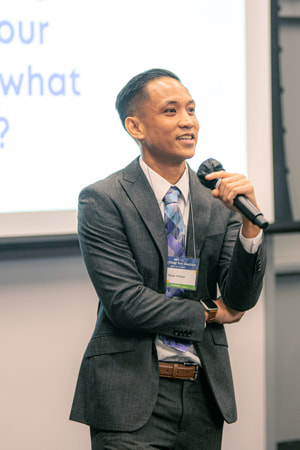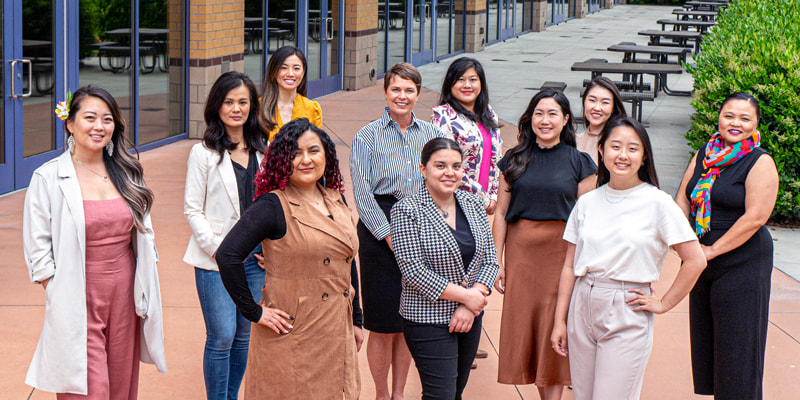Conference Fosters Belonging and Well-being for AAPI Students
|
By Christine Byrd
May 10, 2023 Hundreds of educators gathered both virtually and in-person at UCI for the Teaching for Justice Conference April 28-29, 2023, sponsored by the School of Education’s Center for Educational Partnerships and the UCI Teacher Academy, to learn and discuss opportunities for “Bridging Communities for AAPI Belonging and Well-Being” in K-12 classrooms. Last year’s inaugural conference aimed to curb the alarming growth in anti-Asian hate crimes in the wake of the COVID-19 pandemic giving teachers resources and tools to incorporate Asian American studies into their curriculum. This year, organizers widened the lens of the event to include Pacific Islander as well as Asian American perspectives. “Our conference committee put together this conference last year in hopes of really centering and uplifting our AAPI communities,” said Virginia Nguyen ’01 and MAT ’03, one of the conference organizers, during the opening session. “Building off of last year's theme on Asian American studies, we're now focusing on bridging communities for AAPI belonging and well-being.” |
Over 215 people registered for the virtual session held on Friday, and more than 150 educators, teachers in training and students joined Saturday’s in-person sessions. While most attendees came from Southern California, a few flew in from Northern California and even as far as Illinois – the first state to require schools teach a unit on Asian American history.
The conference’s emphasis on well-being is a response to increasing concerns about young people’s mental health, especially the sharp increase in mental health issues among AAPI youth. U.S. Surgeon General Vivek Murthy, who published an advisory on youth mental health in 2021, recently called declining mental health among children “the crisis of our time.”
“We want to address the real isolation that students are feeling and the mental health issues that teenagers are experiencing,” said Nicole Gilbertson, director of the UCI Teacher Academy. “Together, we’re thinking about the pedagogies that create and sustain a sense of belonging for students in our classrooms to promote well-being.”
Emotional connection formed a cornerstone of the conference, beginning with the opening keynote “Stay Angry: Pedagogical Pathways towards Liberatory Belonging Across AAPI Communities and Beyond” by Stephanie Cariaga, author and assistant professor of teacher education at California State University, Dominguez Hills. Through personal stories of anger in her own life – both absorbing the anger from others and lashing out with her own emotions – Cariaga invited educators to tap into and draw motivation from difficult feelings.
“We need to organize. That, perhaps, is the most powerful expression of anger – to build solidarity across communities to create true belonging,” Cariaga said.
The conference’s emphasis on well-being is a response to increasing concerns about young people’s mental health, especially the sharp increase in mental health issues among AAPI youth. U.S. Surgeon General Vivek Murthy, who published an advisory on youth mental health in 2021, recently called declining mental health among children “the crisis of our time.”
“We want to address the real isolation that students are feeling and the mental health issues that teenagers are experiencing,” said Nicole Gilbertson, director of the UCI Teacher Academy. “Together, we’re thinking about the pedagogies that create and sustain a sense of belonging for students in our classrooms to promote well-being.”
Emotional connection formed a cornerstone of the conference, beginning with the opening keynote “Stay Angry: Pedagogical Pathways towards Liberatory Belonging Across AAPI Communities and Beyond” by Stephanie Cariaga, author and assistant professor of teacher education at California State University, Dominguez Hills. Through personal stories of anger in her own life – both absorbing the anger from others and lashing out with her own emotions – Cariaga invited educators to tap into and draw motivation from difficult feelings.
“We need to organize. That, perhaps, is the most powerful expression of anger – to build solidarity across communities to create true belonging,” Cariaga said.
|
Following a series of virtual breakout sessions that covered topics and provided resources spanning the curriculum, from art to science, participants gathered at the end of day one for a closing plenary session on “Fierce and Fearless: Patsy Takemoto Mink.” Mink, a U.S. representative from Hawaii, was the first Asian American and the first woman of color elected to Congress, and among her legacies is spearheading Title IX, which prohibits discrimination on the basis of gender in education.
The session featured Mink’s daughter, Gwendolyn Mink, and Judy Tzu-Chun Wu, UCI professor of Asian American studies and director of the UCI Humanities Center. The pair co-authored a book on Mink’s life and legacy, and are contributing to a multimedia textbook being developed by the UCLA Asian American Studies Center to support schools implementing California’s ethnic studies requirement. Abigail Chun and Eunice Ho, who are collaborating on the textbook and related curriculum, shared a sneak peek of a lesson plan being created based on Mink’s story. |
“That was the perfect example of what we hope to continue to do, which is bridging the intersection between research and practice – transforming the research done at UCI into meaningful lessons for K-12 students in their classroom,” said Gilbertson. “They are creating curriculum that allows students to be curious, questioning and analytic so they are prepared, ultimately, to think about how they can and will make a difference in their own communities.”
On the second day, educators met at the UCI Student Center for plenary sessions, breakout groups, and to share conversations and ideas over meals. Organizers Nguyen and Stacy Yung kicked off the day with a discussion about “Cultivating Belonging in Our Communities,” and invited participants to share what belonging means to them.
“This activity really showed the importance of highlighting and representing students’ identities, histories, and communities in the classroom, whether through the authors they’re reading, the historical events they’re examining, or the data sets they’re using in science and math classes,” said Gilbertson. “We wanted that multiplicity of thinking around ‘What does belonging mean?’ And it’s clear that representation is an important part of that.”
Local high school students also provided their insights on panels throughout the conference, including a session about the harmful myth of the model minority. Another group of local students shared the outcomes of their PhotoVoice project “What is Love in a Time of Hate?”
The full conference agenda can be found here. Educators interested in learning about future Teaching for Justice conferences or other events from the UCI Teacher Academy can connect here.
The event was sponsored by the School of Education’s Center for Educational Partnerships and the UCI Teacher Academy in partnership with the UCI Humanities Center; the Center for Liberation, Anti-Racism and Belonging; and the UCI Libraries’ Southeast Asian Archive.
“The heart of all of our work over the last two years is cultivating a space of belonging, not just for educators who attend the conference, but for the classrooms and communities to which they belong,” said Thuy Vo Dang, conference organizer and assistant professor of information studies at UCLA. “Orange County is a better place because of all of these participants who care about equity, and who care about creating a more just future for our kids.”
On the second day, educators met at the UCI Student Center for plenary sessions, breakout groups, and to share conversations and ideas over meals. Organizers Nguyen and Stacy Yung kicked off the day with a discussion about “Cultivating Belonging in Our Communities,” and invited participants to share what belonging means to them.
“This activity really showed the importance of highlighting and representing students’ identities, histories, and communities in the classroom, whether through the authors they’re reading, the historical events they’re examining, or the data sets they’re using in science and math classes,” said Gilbertson. “We wanted that multiplicity of thinking around ‘What does belonging mean?’ And it’s clear that representation is an important part of that.”
Local high school students also provided their insights on panels throughout the conference, including a session about the harmful myth of the model minority. Another group of local students shared the outcomes of their PhotoVoice project “What is Love in a Time of Hate?”
The full conference agenda can be found here. Educators interested in learning about future Teaching for Justice conferences or other events from the UCI Teacher Academy can connect here.
The event was sponsored by the School of Education’s Center for Educational Partnerships and the UCI Teacher Academy in partnership with the UCI Humanities Center; the Center for Liberation, Anti-Racism and Belonging; and the UCI Libraries’ Southeast Asian Archive.
“The heart of all of our work over the last two years is cultivating a space of belonging, not just for educators who attend the conference, but for the classrooms and communities to which they belong,” said Thuy Vo Dang, conference organizer and assistant professor of information studies at UCLA. “Orange County is a better place because of all of these participants who care about equity, and who care about creating a more just future for our kids.”




